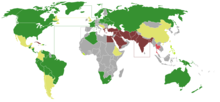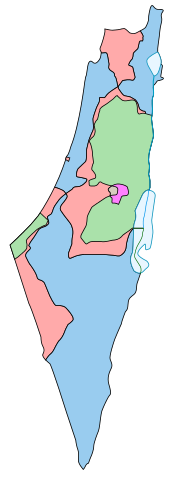聯合國大會第181號決議
| 聯合國大會 第181(II)號決議 | |
|---|---|
 由聯合國巴勒斯坦問題特別調查委員會和巴勒斯坦問題特設委員會(UN Ad Hoc committee)提出並交由聯合國大會表決的巴勒斯坦分割計劃 | |
| 日期 | 1947年11月29日 |
| 會議 | 128 |
| 編號 | A/RES/181(II)(文件) |
投票 | 33票贊成 13票反對 10票棄權 |
| 結果 | 建議巴勒斯坦託管國英國及聯合國所有會員國同意並實施關於巴勒斯坦未來政府的分割方案,並同意由本決議中所建議成立的經濟共同體[1] |
聯合國大會181號決議,即聯合國巴勒斯坦託管地分割方案,於1947年11月29日在聯合國大會通過[2]。該決議提出了兩個臨時國家的建立,一個是猶太國,另一個是阿拉伯國。該決議也建議了區域性經濟共同體的框架,並提出在耶路撒冷成立耶路撒冷獨立個體,委由聯合國治理。
歷史
[編輯]自16世紀馬穆魯克蘇丹國陷落起,巴勒斯坦在內的廣大中東地區便歸於奧斯曼土耳其帝國的統治。奧斯曼土耳其在第一次世界大戰中加入同盟國,與英法為首的協約國為敵,英國暗中支持阿拉伯人發動阿拉伯起義,其埃及遠征軍與土耳其爆發西奈及巴勒斯坦戰役,以英軍勝利告終,並於1918年簽署了穆德洛斯停戰協定,英國在戰後接管了巴勒斯坦而成為國聯巴勒斯坦託管地。
1917年至1948年間,因爲種族歧視及納粹大屠殺等原因,大量猶太人湧入曾經是猶大王國所在的巴勒斯坦地區,這使得巴勒斯坦人與猶太人的衝突開始激烈化。1947年2月18日,英國外交大臣貝文於英國國會下議院表示巴勒斯坦地位問題將會提交到聯合國議決。1947年4月2日,英國正式向聯合國提出將巴勒斯坦問題列入會議日程的請求[3]。
根據方案,計劃於1948年8月1日,英國結束在巴勒斯坦的委任統治,英國軍隊全面撤走,緊接的兩個月是由聯合國監管的過渡時期,1948年10月1日監管時期結束,新成立的國家正式完全獨立。
決議內容
[編輯]聯合國大會181號決議內容:英國於1948年8月1日之前結束在巴勒斯坦的委任統治,並撤出其軍隊;兩個月後,在總面積2.7萬平方公里的巴勒斯坦的土地上建立兩個國家,即阿拉伯國和猶太國。
根據分治決議的藍圖,阿拉伯國國土11203平方公里,約占當時巴勒斯坦總面積的43%,人口中阿拉伯人為72.5萬人,猶太人為1萬人;猶太國國土為14942平方公里,約占巴勒斯坦總面積的57%,人口中阿拉伯人為40.7萬人,猶太人為49.8萬人。擬議的猶太國家的大部分領土由內蓋夫沙漠組成[4],在當時不適合發展農業,也不適合城市發展。決議還規定:成立耶路撒冷市耶路撒冷獨立個體,由聯合國治理。
分割方案的主要目標是實現兩個族群間的政治分治而經濟一體[5],方案盡可能納入較多的猶太人進猶太國,這意味著把部份阿拉伯人佔多數但猶太人也佔顯著數量的地區納入猶太國。因此,猶太國家總體上將擁有顯著數量的阿拉伯人。另外,人口稀少的地區(例如內蓋夫沙漠)也被納入猶太國家,以便為可能出現的移民提供空間。根據方案,居住在猶太國的猶太人和阿拉伯人將成為猶太國的公民,而居住在阿拉伯國的猶太人和阿拉伯人將成為阿拉伯國的公民。
| 國家 | 阿拉伯人 | 阿拉伯人佔比 | 猶太人 | 猶太人佔比 | 總人口 | |
|---|---|---|---|---|---|---|
| 阿拉伯國 | 725,000 | 99% | 10,000 | 1% | 735,000 | |
| 猶太國 | 407,000 | 45% | 498,000 | 55% | 905,000 | |
| 耶路撒冷國際特別政權 | 105,000 | 51% | 100,000 | 49% | 205,000 | |
| 總數 | 1,237,000 | 67% | 608,000 | 33% | 1,845,000 | |
| 另外在旱季時在猶太國內亦有約九萬名貝都因人。 | ||||||
| 節錄自聯合國巴勒斯坦問題特別調查委員會報告第四章 1947年9月3日 | ||||||
各方反應
[編輯]猶太人
[編輯]主流猶太復國主義領導人強調建設現代猶太國家的重大責任,並致力於與該地區其他居民和平共處[6][7];但也有修正派猶太復國主義,特別是大衛·本-古里昂,認為接受該計劃是一個戰術步驟,也是未來在整個巴勒斯坦領土擴張的踏腳石。[8][9]
表決結果
[編輯]
表決最終在1947年11月29日舉行,根據投票規則議案需要在57個聯合國成員國中以三分之二的大比數通過(不計算缺席和棄權的票數)。議案以有效票33票(72%)贊成、13票反對下通過。美國與西歐國家,蘇聯爲首的東歐共產陣營,都在表決中投下贊成票,英國作爲託管國以棄權表示中立,伊斯蘭國家及阿拉伯國家則反對議案。
| 贊成國(33) | 反對國(13) | 棄權國(10) | 缺席國(1) |
|---|---|---|---|
| 東歐國家: 西歐國家: 美洲國家: 亞洲國家: |
歐洲國家: 美洲國家: 非洲國家: 亞洲國家(中東): |
東歐國家: 西歐國家: 美洲國家: 非洲國家: 亞洲國家: |
亞洲國家: |
後續
[編輯]
1949年停火線(綠線):
儘管決議獲得聯合國大會通過,巴勒斯坦分治方案和經濟共同體的構想最終並沒有實現。決議通過後巴勒斯坦託管地的猶太人和阿拉伯人之間隨即爆發一系列的暴力事件,又稱為1947-48年巴勒斯坦內戰 [10]。1948年5月14日,英國的託管期結束,其在巴勒斯坦的最高級官員巴勒斯坦高級專員及英國軍隊撤出耶路撒冷和巴勒斯坦地區。英國在離開前沒有採取任何措施為耶路撒冷及巴勒斯坦實現第181號決議下的國際政權和以巴分治[11],因而留下了一個權力真空。當天傍晚,猶太國民議會聚集在以色列獨立廳(當時的特拉維夫藝術博物館)通過以色列獨立宣言,宣布依照聯合國大會通過的本決議,建立獨立的以色列國(即本決議的猶太國)[12]。一天後的5月15日,阿拉伯國家聯合發起對以色列的進攻,意圖消滅以色列,引發了第一次中東戰爭。[13]
戰爭於1949年結束,戰後的以色列佔領比聯合國分割方案更多的領土,而阿拉伯人控制的加沙地區及約旦河西岸分別由埃及和約旦控治,約旦河西岸1948年在耶利哥會議後,在1950年被正式吞併入約旦,直到1967年的六日戰爭為止。
巴勒斯坦立國法理依據
[編輯]1988年,巴勒斯坦解放組織以聯合國大會第181號決議為依據,宣佈了巴勒斯坦獨立宣言並隨之獨立,本決議仍然繼續為巴勒斯坦人民享有主權和民族獨立的權利提供國際的合法性[14]。 許多學者發表了支持這種觀點的文章[15][16][17]。
聯合國大會在2003年通過第ES-10/14(2004)決議,將包括第181號決議案的以巴衝突問題向國際法院要求提供諮詢意見[18]。法官Abdul Koroma在判詞中表述了多數意見:「法院認為自決權是國際法下既定和公認的權利,適用於巴勒斯坦的土地及其人民。因此,此自決權利使巴勒斯坦人民有權利按照第181號決議案和隨後的多個決議案建立他們自己的國家。[19] 」
回顧
[編輯]2011年,時任巴勒斯坦總統馬哈茂德·阿巴斯承認阿拉伯國家在1947年拒絕聯合國的巴勒斯坦分割方案是一個錯誤,他希望可以加以糾正[20]。
參考文獻
[編輯]- ^ A/RES/181(II) of 29 November 1947. United Nations. 1947 [8 December 2012]. (原始內容存檔於2017-10-10).
- ^ 聯合國大會 第-1屆會議 Resolution 181. Future government of Palestine A/RES/181(II) 29 November 1947. [2008-09-01].
- ^ 殷罡:巴勒斯坦阿拉伯国法律地位的确立. 《阿以衝突:問題與出路》第8、9、10章(國際文化出版公司,2002年版). 共識網. 2014-07-14. (原始內容存檔於2015-12-08).
- ^ Benny Morris. 1948: a history of the first Arab-Israeli war. Yale University Press. 2008: 47 [13 July 2013]. ISBN 978-0-300-12696-9. (原始內容存檔於2023-01-19).
The Jews were to get 62 percent of Palestine (most of it desert), consisting of the Negev
- ^ United Nations Special Committee on Palestine: Report to the General Assembly: Volume 1: 51. 3 September 1947 [20 April 2017]. A/364(SUPP). (原始內容存檔於2021-10-01).
The primary objectives sought in the foregoing scheme were, in short, political division and economic unity: to confer upon each group, Arab and Jew, in its own territory, the power to make its own laws, while preserving both, throughout Palestine, a single integrated economy, admittedly essential to the well-being of each, and the same territorial freedom of movement to individuals as is enjoyed today.
- ^ Palestine Jewry Joyous at News; Ben-Gurion Voices Attitude of Grateful Responsibility – Jerusalem Arabs Silent. The New York Times. 30 November 1947: 58 [9 January 2012]. (原始內容存檔於2024-04-09).
- ^ Vote On Palestine Cheered by Crowd. The New York Times. 30 November 1947 [9 January 2012]. (原始內容存檔於2023-10-16).
- ^ David McDowall (1990). Palestine and Israel: The Uprising and Beyond. I.B. Tauris. p. 193.. ISBN 9780755612581.
Although the Jewish Agency accepted the partition plan, it did not accept the proposed borders as final and Israel's declaration of independence avoided the mention of any boundaries. A state in part of Palestine was seen as a stage towards a larger state when opportunity allowed. Although the borders were 'bad from a military and political point of view,' Ben Gurion urged fellow Jews to accept the UN Partition Plan, pointing out that arrangements are never final, 'not with regard to the regime, not with regard to borders, and not with regard to international agreements'. The idea of partition being a temporary expedient dated back to the Peel Partition proposal of 1937. When the Zionist Congress had rejected partition on the grounds that the Jews had an inalienable right to settle anywhere in Palestine, Ben Gurion had argued in favour of acceptance, 'I see in the realisation of this plan practically the decisive stage in the beginning of full redemption and the most wonderful lever for the gradual conquest of all of Palestine.
- ^ Sean F. McMahon. The Discourse of Palestinian-Israeli Relations. Routledge. 2010: p40.
"The Zionist movement also accepted the UN partition plan of 1947 tactically. Palumbo notes that 「[t]he Zionists accepted this scheme [the UN partition plan] since they hoped to use their state as a base to conquer the whole country.」 Similarly, Flapan states that 「[Zionist] acceptance of the resolution in no way diminished the belief of all the Zionist parties in their right to the whole of the country [Palestine]」; and that 「acceptance of the UN Partition Resolution was an example of Zionist pragmatism par excellence. It was a tactical acceptance, a vital step in the right direction – a springboard for expansion when circumstances proved more judicious.」
- ^ Article "History of Palestine", Encyclopædia Britannica (2002 edition), article section written by Walid Ahmed Khalidi and Ian J. Bickerton.
- ^ Yoav Gelber, Independence Versus Nakba; Kinneret–Zmora-Bitan–Dvir Publishing, 2004, ISBN 965-517-190-6, p.104
- ^ Declaration of Establishment of State of Israel: 14 May 1948. [2020-07-01]. (原始內容存檔於2012-03-21).
- ^ Cablegram from the Secretary-General of the League of Arab States to the Secretary-General of the United Nations 15 May 1948: Retrieved 4 May 2012
- ^ See Request for the admission of the State of Palestine to Unesco as a Member State (PDF). UNESCO. 12 May 1989 [2020-06-28]. (原始內容 (PDF)存檔於2011-07-28).
- ^ See The Palestine Declaration To The International Criminal Court: The Statehood Issue Archived copy (PDF). [19 July 2009]. (原始內容 (PDF)存檔於16 July 2011). and Silverburg, Sanford R. (2002), "Palestine and International Law: Essays on Politics and Economics", Jefferson, N.C: McFarland & Co, ISBN 0-7864-1191-0, pages 37–54
- ^ See Chapter 5 "Israel (1948–1949) and Palestine (1998–1999): Two Studies in the Creation of States", in Guy S. Goodwin-Gill, and Stefan Talmon, eds., The Reality of International Law: Essays in Honour of Ian Brownlie (Oxford: Clarendon Press, 1999)
- ^ Sourcebook on public international law, by Tim Hillier, Routledge, 1998, ISBN 1-85941-050-2, page 217; and Prof. Vera Gowlland-Debbas, "Collective Responses to the Unilateral Declarations of Independence of Southern Rhodesia and Palestine, An Application of the Legitimizing Function of the United Nations", The British Yearbook of International Law, 1990, pp.l35-l53
- ^ 以色列在被占领的东耶路撒冷和其余被占领巴勒斯坦领土的非法行动 (PDF). 12 December 2003 [2020-06-28]. (原始內容存檔 (PDF)於2020-06-28).
- ^ See paragraph 5, Separate opinion of Judge Koroma 網際網路檔案館的存檔,存檔日期4 June 2011.
- ^ Abbas should change his locks before next wave of Palestinian prisoners freed. Haaretz. 6 December 2011 [2020-06-28]. (原始內容存檔於2012-06-16).
